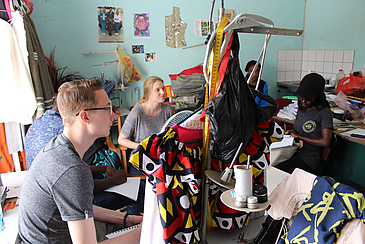The project was funded by the University’s Internationalization Fund and the Faculty of Business Studies and economics. “Now they’re back, the master students want nothing more than to carry on with the work they began,” says project manager Dr. Aki Harima, who researches and teaches at the University of Bremen’s LEMEX - Lehrstuhl für Mittelstand, Existenzgründung und Entrepreneurship [Chair for Small Business, Start-ups and Entrepreneurship]. Three projects have emerged after an analysis phase on site. During this preparatory work, the participants conducted more than 20 interviews with entrepreneurs in the Southwest African country. Six students and one doctoral candidate subsequently suggested initial courses of action and will now continue to follow the implementation. They are supported by students and lecturers of the Namibia University of Science and Technology (NUST).
Start-up marketing in Windhoek as a result of research-based learning
The first group developed a new concept for the Bokamoso Entrepreneurial Center. “When we arrived, nothing was in place: No one had any idea about how to attract tourists and get them to spend money in the shops,” says Dr. Harima. According to the plan, the site is now to become a cultural center. The gray corrugated iron barracks are to be daubed in bright and cheerful colors. Tourists should be able to experience authentic Namibian culture. So far, there are hardly any such opportunities in the region.
The second group found that many startup entrepreneurs lack the necessary knowledge. For example, they needed to know something about marketing and have a social media strategy. At the same time, the NUST students were desperately looking for internships, which until now have been in very short supply. The Bremen guests therefore set up a web portal, where companies can promote themselves and students can seek and hopefully find internship opportunities.
Finally, the third group proposed an online learning platform that will provide knowledge on such vital skills for start-up entrepreneurs as business plans and budgeting. The entrepreneurs will be able to use these going forward. “We want to continue and intensify the initiated exchange,” says the project leader. The LEMEX Chair is now working on applications for funding to the German Academic Exchange Service (DAAD). The aim is to promote the exchange of students and scientists between the two countries and make the successful project sustainable.
More information under:
https://ttwebs.wixsite.com/bokamoso - the web presence developed by a group of students for the Bokamoso Start-up Center.
Members of the press: You can find a photo of the Namibia project under: https://seafile.zfn.uni-bremen.de/f/5c58206d031f469699ed/
If you would like to have more information on this topic, feel free to contact:
Dr. Aki Harima
University of Bremen
Faculty of Business Studies and Economics
LEMEX – Chair for Small Business, Start-ups and Entrepreneurship
Phone: +49 421 218 66867
Email: harimaprotect me ?!uni-bremenprotect me ?!.de

